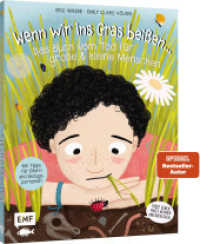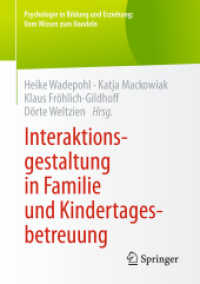- ホーム
- > 洋書
- > 英文書
- > Literary Criticism
Full Description
Explores Victorian writers' conception of the novel's potential to become serious knowledge and differentiate itself from other educational genres.
Is the novel a category of knowledge that merits serious study? Even if the novel has shed the stigma of being mindless entertainment, one might easily assume that reading a novel is not "studying," unless one reads closely and carefully, preferably from a scholarly edition or for a scholarly purpose. Novel Pedagogy explores how Victorian writers envisioned the novel's potential to become knowledge long before the form's ascendence into the ivory tower. Liwen Zhang argues that Victorian novelists' constant critique of schooling, on the one hand, and their frequent invocation of deep knowledge, on the other, are not self-contradictory. Instead of offering a blissful escape from education, writers such as William Thackeray, Charles Kingsley, Charles Dickens, Elizabeth Gaskell, George Eliot, and George Gissing seek to offer uniquely novelistic pathways to knowledge. Novel Pedagogy offers a new model of novelistic epistemology by showing how the novel, unlike other educational genres, reflects on the unpleasant realities of learning-and of not learning-amid the ubiquity of ineffective textbooks, reluctant students, and false motivations.
Contents
Acknowledgments
Introduction: What Kind of Knowledge Does the Novel Teach?
1. William Thackeray, the Character Sketch, and the Portrait of a Novelist in Literary History
2. Charles Kingsley and the Novelist as Poetry Instructor
3. Great Expectations and Dickens's Spelling Book Predicament
4. Elizabeth Gaskell and the Ambiguity of Useful Knowledge
5. George Eliot's "Graceful Mark of Instruction" and the Novel as "Shallow" Knowledge
6. George Gissing and the Elusive Art of Fiction
Coda: Can There Ever Be an Endgame for the Novel's Intellectual Rise?
Notes
Bibliography
Index


![ぐりとぐらカレンダー 〈2023〉 [カレンダー]](../images/goods/ar2/web/imgdata2/48340/4834062287.jpg)





